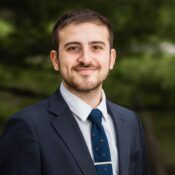
Speaker
Martiniano Etchart
Doctoral Student
An Argentina native, Martiniano joined the Second Language Acquisition Doctoral Program at the University of Wisconsin-Madison in 2021. At UW-Madison, Martiniano has taught Spanish, English, and worked as a tutor at the Writing Center. Currently, he is the Language Institute’s Project Assistant. Through this position, he has been able to closely collaborate with the Language Ideology and Linguistic Discrimination working group as well as develop an ongoing video project on student voices of belonging at the UW-Madison campus. In his research, he is interested in second/foreign language educators and learners’ psychology (e.g., cognitions and emotions) as well as in ideologies of native speakerism.
Speaking in
Understanding and Addressing Linguistic Bias and Discrimination
This breakout session will focus on the concrete ways that language ideologies — attitudes and beliefs about the nature of language and about language variation — can reinforce and perpetuate stereotypes and result in discriminatory practices. The session will introduce a ‘raciolinguistic’ perspective to explore questions such as: What is standard(ized) English and whose language does it (not) represent? What does it mean to have an accent or to think you don’t? How do our beliefs about language influence how we perceive and treat others? What is linguistic discrimination? Participants will examine their own beliefs related to language, linguistic diversity, and language variation, and consider ways in which linguistic ideologies result in discriminatory practices in educational and other settings. Participants in this session will bridge the divide by learning how variation is an inherent characteristic of human language and how racial and other inequities are perpetuated by the stigmatization of certain language varieties. Participants in the session will realize belonging by considering how to identify and address linguistic bias and discrimination in their academic, professional and personal lives by engaging in reflection and in critical discussion with the presenters and one another.